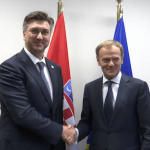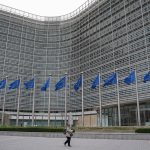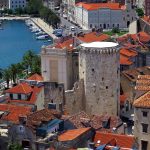ZAGREB, July 1, 2018 – Prime Minister Andrej Plenković has said that Croatia can be mostly satisfied with the five years of its membership in the European Union because it has brought many benefits to the citizens and that Croatia is now a better organised, more prosperous and more just society than it was at the start of its EU journey.
Speaking in an interview with the Večernji List newspaper to mark Croatia’s accession to the EU on 1 July 2013, Plenković said that the membership had brought many benefits to the citizens and international political and security credibility to Croatia, and provided a boost to economic development on sound foundations.
“Having accepted the European values and the acquis communautaire, the European Union has helped Croatia become a better organised, more prosperous and more just society than it was at the start of its EU journey,” Plenković said, adding that as a member of the bloc “we co-create European policies that have a direct effect on our workers, businesses, exporters, students and others.”
Accession to the EU marked the beginning of Croatia’s economic recovery after six years of recession, the prime minister said, stressing the importance of EU funds, from which Croatia has so far drawn 8.4 billion kuna more than it has paid into the EU budget.
With the opening of the EU market, Croatian exports have increased from 9 billion euro to 14 billion euro. Croatia came out of the Excessive Deficit Procedure, recorded a budget surplus for the first time and continues to reduce its public debt. The financial and economic effects of the membership will be fully visible only after the expiry of the next EU budget for the 2021-2027 period, the prime minister said.
“The progress that was made by the countries that joined the EU before us (in 2004) only shows how much EU membership pays off. I am certain that Croatia too will make similar progress in the years ahead. That is precisely why I believe in the European project, and I believe that Croatia will take all the advantages offered by the membership,” Plenković said.
In light of his announcement that 2018 will be a year of reforms, Plenković said that his government had three basic goals: to run public finances rationally, launch a stronger investment cycle and continue implementing structural reforms.
He noted that it was his government that had opened a public debate on the pension reform for the first time after 2002 with a view to ensuring “a sustainable pension system and decent pensions for future generations.”
He added that a number of demographic and pro-birth measures had been taken, maternity and parental allowances had been increased, and child benefits had been extended to include another 150,000 children. A new tax reform would follow next year to further reduce the tax burden on citizens and businesses.
“The other key reforms are those of the healthcare system, public administration and the judicial system in order to rationalise costs and modernise these systems,” the prime minister said, adding that a set of judicial bills would soon be put to a vote in parliament, the Healthcare Bill and a set of measures to ease the position of citizens with blocked bank accounts were in first reading and a new enforcement bill was being prepared.
“We are initiating a cycle of reforms that have been delayed for years. And all this will happen in the next six months. Just remember what the situation in Croatia was like a few years ago when ideological squabbles dominated. I am glad that for weeks now we have been discussing in public whether it is better to reduce the general VAT rate or income tax. That is a step forward,” he said.
Commenting on the referendum initiatives that seek changes to election rules and the representation of ethnic minorities, Plenković said that the aim of these initiatives was to weaken his Croatian Democratic Union (HDZ) party and gain political legitimacy by lowering the election threshold.
“Irresponsible populism with such ‘brilliant’ ideas as non-vaccination of children or leaving the EU would take the Croatian society 50 years back. The HDZ under my leadership has decided to fight against this trend. A referendum is not a way to decide on a country’s electoral system. It is clear which marginal and exclusive political groups are behind the referendums. I do not know how the initiators of these ideas, who often invoke sovereignty, forgot that the constitutional law on the rights of ethnic minorities was adopted as one of the preconditions for the international recognition of Croatia. That was part of Franjo Tuđman’s state-building policy which they obviously do not understand,” the prime minister said.
Talks on improving the electoral system are necessary, but not by referendum, he added, noting that the HDZ was the biggest advocate of preferential voting because this system had secured it many election victories. “We have nothing against circling a greater number of candidates on a slate or against introducing preferential voting in local elections. We want to introduce postal voting for Croatian nationals abroad and are also seeking ways of aligning electoral units with the number of voters,” the prime minister said.
Plenković said that a grand coalition between the HDZ and the Social Democratic Party (SDP) was not possible. “For a grand coalition you need at least two big parties, and right now I can see only one that has good solutions and the people to change Croatia for the better. A grand coalition with the SDP would only reduce our reform capacity and that is not what the people expect from us,” Plenković said.
He said that in the Croatian parliament, apart from petty politicking and demagoguery, he had not heard from the SDP any concrete proposals that would contribute to the reform efforts.








